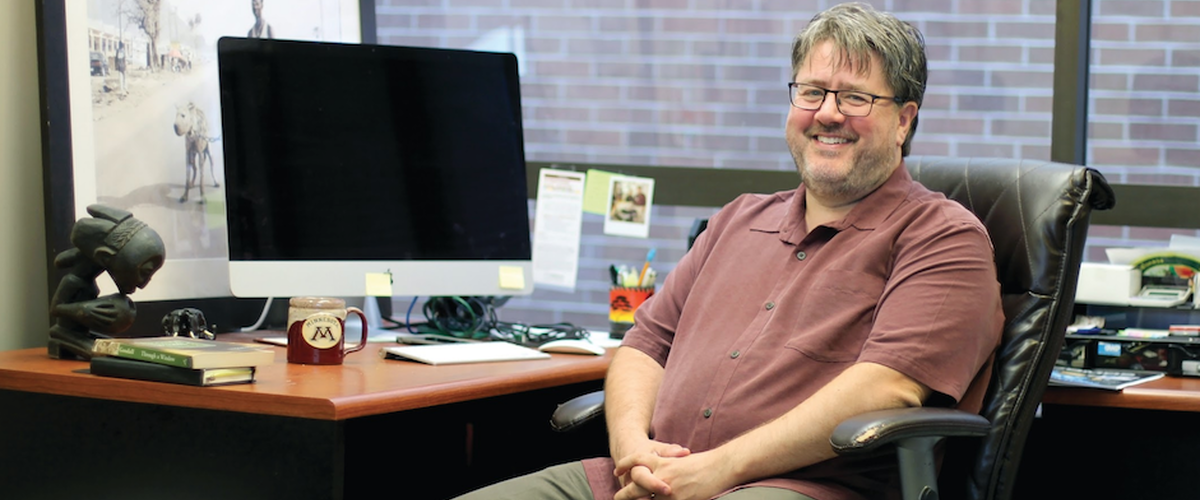Researcher Spotlight: Dominic Travis
The CGHSR Researcher Spotlight features global health researchers from the University of Minnesota and its partner sites.
UMN Researcher: Dominic Travis, DVM, MS, Veterinary Population Medicine
Research Site: Multiple sites and collaborations in Sub-Saharan Africa and Southeast Asia
Dr. Dominic Travis is an available mentor for the CGHSR Scholars Program. In this researcher spotlight, he answers a few of our questions on his research and his expectations for mentees.
Q: What do you study?
A: My research follows theories and methods under the paradigm of ecosystem health. Ecosystem health practitioners focus on issues and systems that include sustainability and resilience shared by humans, animals and the environment. Things like food security, infectious disease spillover, sustainable and resilient ecosystems that support health and well being. Much of my time is spent in Africa working in and around conservation areas (forest and savanna ecosystems) on infectious disease issues. Recently, I have been embracing more social science to understand human behavior and culture as drivers of risk with respect to wildlife trade and wild meat consumption.
Q: Why do you think this research is important?
A: Well, this is the story of COVID-19, HIV emergence, Ebola, and other important issues. We are trying to flip the narrative from panic surrounding potential pandemics to understand how and why these things happen and how we can help communities thrive and manage risk at the same time. This starts with understanding the systems and how people act in them from their point of view, not ours. This takes time and there are many wrong turns and tough lessons along the way. But, by engaging and supporting people in their own sustainability and resilience (which is no different than saying health and wellbeing), we all learn and improve together. The new world will require new approaches, and we think this fits.
Q: Why is it important for you to conduct research at international sites?
A: I conduct research and training in Minnesota and with international partners abroad, but most of my background is in Veterinary Global/Public Health, so the external world has been more my focus career-wise. I enjoy working around the world and establishing partnerships with those from other cultures. I enjoy the global perspective but I am starting to see the need to also focus at home a bit more as well.
Q: What types of students have you mentored at your international site?
A: I have been involved with about 13 East African students, some at their home institutions and others that come to UMN (based upon funding and their personal logistics). They usually want to work on problems they have identified 'at home'. Other times, US students come to me with a site or idea in mind and I help them outline goals and objectives, methods, etc. It is more about the types of problems and ways to use research to 'help' than anything else. Then, it is obviously about finding the funding. Many of my Fogarty Fellows through CGHSR have used this period as part of their graduate program at home or at UMN.
Q: Where do you conduct research?
A: Long-term collaborative sites I am involved with include Gombe National Park, Tanzania; Queen Elizabeth National Park, Uganda; several areas of Kenya including Masai Mara; collaboration with the Pan African (ape) Sanctuary Alliance; as well as indigenous people in North America, Guyana, Viet Nam and Cambodia. These sites are all very collaborative but sensitive, so students usually either come from these areas or go through a process of relationship building with the team first.
Q: What do you look for in a mentee?
A: There are many smart people, and intelligence is important. However, I am seeking to foster multi-cultural professionals. In that I mean that I want people to build their fluency across cultures along with their technical skill set, since this is a key to success in international and multi-disciplinary collaboration. I look for those that I think can help lead the next generation of multi-cultural/disciplinary teams. I tend to select for leadership, diversity (in many forms: racial, gender, cultural, disciplinary, etc.) and passion — those who feel a bit mission driven.
To sum up, I am less focused on specific lines of work or field sites, and more about people and goals. We have several large multi-disciplinary teams so connecting to mentors with specific skill sets is usually easy. I am happy to chat with anyone about how I may be able to help their agenda and how the programs I am involved with fit — or do not fit — their career goals. My hope is that, some day, with enough people raised to the right level, we may be able to help connect nature and human well-being in a more sustainable and resilient way.
If you would like your global health research to be featured in upcoming Researcher Spotlight series, please contact [email protected].
Researcher Spotlights
Discover more about our other CGHSR Researcher Spotlights that feature global health researchers from the University of Minnesota and its partner sites.
